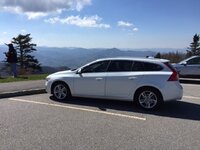Actually I prefer the Mazda way by developing SkyActiv Technology to improve the car efficiency and not following most other car manufactures simply adding turbo charger(s) and using CVT to achieve better EPA pre-programmed test circle numbers. I keep my new car for a long time and I don't like the idea of replacing expensive turbo charger(s) and fixing the CVT when the car is getting older...
The CX-5 is our first Mazda and this is the reason right here.
I have no problem (sort of) with hanging a turbo on a small displacement ICE to get more giddy-up and an attempt at better mileage. But this is becoming the default path for too many manufacures. I understand that emmisions and CAFE standards are a moving target, sucking up R&D budgets to comply but... If you've ever watched heavy equipment working in dark it might make you wonder if you want that going on in you family car, just sayin'.
Mazda has taken proven ideas integrated and refined them for the Sky-Activ. An efficient and reasonably powerful for it's size normally aspirated ICE is a work of beauty. Just as the old factory stock 426 Hemi putting out 425 hp with a carborator back in the day was a marvel, the Sky-Activ integration of good engineering, utilizing the effiency of a partial Atkison Cycle while bumping up the compression ratio to improve torque and horsepower WITHOUT resorting to a supercharger or turbocharger is impressive thinking. The only issue I have is will this motor last? Time will tell.
I would chose a manual transmission over and automatic in any vehicle. I and SWMBO dislike the driving characteristics of a CVT which is why the CRV, Rogue and Subaru were scratched off the list as soon as we finished the test drive. Since it seems folks don't care to shift any more, we are stuck with autos. The driving feel of the Sky-Activ 6spd in the CX-5 is very satisfying to both of us who would rather row the shifter even in town than lolly-gag an auto. Crisp shifting, tight control, engine braking if needed and possible manual selection of each gear.
Pretty ballsy stuff from a tiny auto maker trying to hang on I think.
Please, I don't diss anyone for thier choice of vehciles. I love cars, all have something to admire. Ford, Vovlo, BMW, VW, Audi, GM, even Fiat have something to appreciate. Mazda is just taking a different path right now and it makes some sense.


